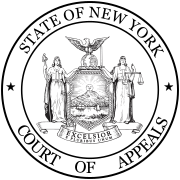| Capitol Records, Inc. v. Naxos of America, Inc. | |
|---|---|
 | |
| Court | New York Court of Appeals |
| Full case name | Capitol Records, Inc. v. Naxos of America, Inc. |
| Decided | April 5, 2005 |
| Citation(s) | 4 N.Y.3d 540; 797 N.Y.S.2d 352; 830 N.E.2d 250; 74 U.S.P.Q.2d 1331 |
| Case history | |
| Prior action(s) | Summary judgment granted, 262 F. Supp. 2d 204, 274 F. Supp. 2d 472 (S.D.N.Y. 2003); question certified, 372 F.3d 471 (2d Cir. 2004). |
| Court membership | |
| Judges sitting | Judith S. Kaye, George Bundy Smith, Carmen Beauchamp Ciparick, Albert Rosenblatt, Victoria A. Graffeo, Susan Phillips Read, Robert S. Smith |
| Case opinions | |
| Decision by | Graffeo |
Capitol Records, Inc. v. Naxos of America, Inc., 4 N.Y.3d 540 (2005), is one of "the most notable case[s]"[1] concerning the copyright status of US-published sound recordings issued before February 15, 1972 (frequently called "pre-1972 sound recordings"). In this case, the New York Court of Appeals held that pre-1972 sound recordings, which are not given copyright under U.S. federal law, may be covered under state common law copyright.[2]
Naxos Records restored and issued on CD a number of mid-20th century sound recordings, including several classical music performances by Pablo Casals, Edwin Fischer, and Yehudi Menuhin. Capitol Records, which held the U.S. licenses for those works, also remastered and reissued on CD the same recordings.[3]
Capitol sued Naxos in the Southern District of New York, which held that because the items were in the public domain in their country of origin (the United Kingdom), they were also in the public domain in the US.[4][3] On appeal, the Second Circuit held that while federal copyright protection was not available, the state of New York may or may not have common law copyright.[5] The Second Circuit certified the question to the state of New York, which considered several questions, including the question of whether a state's common law copyright protection might survive the expiration of a work's copyright in its country of origin.[3]
The New York Court of Appeals held that, because Congress had not preempted common law copyright for pre-1972 sound recordings, that common law copyright was available.[3] Because common law copyright was not bound by federal and international rules regarding expiration into the public domain, Capitol's claim survived.[3]
The case was hailed in some quarters, and critiqued in others, but most commentators acknowledged that it was a "landmark",[6] and "groundbreaking"[7] decision, carrying significance for both music preservation and commercialization of recordings before 1972.
On December 20, 2016, the New York Court of Appeals ruled that this common-law right includes only the exclusive right to duplication and publication, and not to public performance. That case, Flo & Eddie v. Sirius XM Radio, ruled that no such common law right to public performance existed in New York.[8][9]
YouTube Encyclopedic
-
1/2Views:535 07810 448
-
Show Me The Money - The Patrice O'neal Documentary Indiegogo Scam
-
Ask a Fixer: Setting Up Transfer Pricing Between Plants
Transcription
Notes
- ^ United States Copyright Office, "Federal Copyright Protection for Pre-1972 Sound Recordings", Dec. 2011 (p.32).
- ^ Capitol Records, Inc. v. Naxos of America, Inc., 4 N.Y.3d 540 (2005).
- ^ a b c d e Neil J. Rosini, Michael I. Rudell, "Pre-1972 Sound Recordings -- A Legal Breed Apart" Archived 2014-04-15 at the Wayback Machine, FWRV, Oct. 28, 2013.
- ^ Capitol Records, Inc. v. Naxos of America, Inc., 262 F. Supp. 2d 204, 274 F. Supp. 2d 472 (S.D.N.Y. 2003).
- ^ Capitol Records, Inc. v. Naxos of America, Inc., 372 F.3d 471 (2d Cir. 2004).
- ^ Brandy Karl, "Finding Traditional Contours in the Common Law", Tulane Law J. 2008 (draft of article available online)
- ^ Joseph I. Rosenbaum, "Music on Hold" Archived April 15, 2014, at the Wayback Machine, LegalBytes, April 29, 2005.
- ^ Klepper, David (December 20, 2016). "OWNERS OF 1967 HIT SONG 'HAPPY TOGETHER' LOSE COPYRIGHT CASE". Associated Press. Archived from the original on December 21, 2016. Retrieved December 20, 2016.
- ^ Stein, J. "Flo & Eddie, Inc. v Sirius XM Radio, Inc". NYCourts.gov. New York State Law Reporting Bureau. Retrieved December 24, 2016.
Further reading
- Timothy P. Best, "Capitol Records, Inc. v. Naxos of America, Inc.: The Persistence of Copyright on That Old Time Rock n' Roll", 21 Berkeley Tech. L.J. 335 (2006)
- Ronan Deazley, "Capitol Records v. Naxos of America (2005): Just Another Footnote in the History of Copyright?", 53 J. Copyright Soc'y U.S.A. 23 (2005-2006).
- Norman Lebrecht, "Whose Music Is It Anyway?", La Scena Musicale, April 13, 2005
- Henry Lee Mann, "As Our Heritage Crumbles Into Dust: The Threat of State Law Protection for Pre-1972 Sound Recordings", 6 Wake Forest Intell. Prop. L.J. 45 (2006)
- Brendan Scott, "Some Notes on Capitol Records, Inc. v. Naxos of America Inc., Groklaw, April 13, 2005
- Michael Smith, "Gotta Fight for Your Right to Perform: Scope of New York Common Law Copyright for Pre-1972 Sound Recordings Post-Naxos", 30 Loy. L.A. Ent. L. Rev. 589 (2009-2010)
External links
- Text of Capitol Records, Inc. v. Naxos of America, Inc., 4 N.Y.3d 540 (2005) is available from: CourtListener Google Scholar Leagle New York Courts
